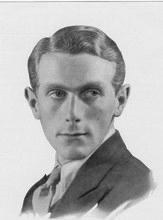1940
Maciejewski begins his collaboration with the Swedish Radio, where until 1944 he would host a regular Chopin programme.
He writes a number of piano pieces: Prelude, Obsession, Dream, Echo and Seven Swedish Dances for two pianos.
5 March — Joseph Stalin signs a decree authorising the killing of Polish prisoners of war.
29 June — Paul Klee dies in Switzerland.
21 October — publication of Ernest Hemingay’s novel For Whom the Bell Tolls.
7 November — premiere of Igor Stravinsky’s neoclassical Symphony in C.
1941
Maciejewski often performs in a duet with the Swedish pianist Sixten Eckeberg.
- Sixten Eckerberg (1909–1991), source: Public Domain
15 January — Olivier Messiaen’s Quatour pour la fin du temps is performed in a prisoner-of-war camp in Görlitz.
22 June — Germany attacks the Soviet Union.
9 October — the US President Franklin Delano Roosevelt decides to launch a programme aimed at building an atom bomb. The project would come to be known as the Manhattan Project.
1942
23 August — beginning of the Battle of Stalingrad, a turning point in the Second World War.
14 February — establishment of the Home Army (formed from the Union of Armed Struggle).
1943
Maciejewski composes Oberek for two pianos.
19 April — outbreak of the Warsaw Ghetto Uprising.
28 November—1 December — conference of superpowers in Teheran.
8 October — Béla Bartók finishes his Concerto for Orchestra.
28 March — Sergei Rachmaninoff dies in Beverly Hills.
1944
On 9 March Maciejewski appears in concert with the Swedish pianist Alex Portnoff, performing his arrangements as well as his own pieces for two pianos.
The composer’s health deteriorates. He undergoes a serious operation.
Maciejewski composes Alllegro concertante for piano and orchestra.
1 February — death of Piet Mondrian.
1 August — outbreak of the Warsaw Uprising. It would bring destruction to the city and death to the poets Krzysztof Kamil Baczyński, Tadeusz Gajcy and the composer Roman Padlewski.
13 December — Wassily Kandinsky dies in France.
1945
11 January — the premiere of Maciejewski’s Allegro concertante in Göteborg is well received by the audience and the critics.
The composer begins working on his monumental Requiem dedicated to the victims of war.
More health problems (and more surgeries). Unfortunately, doctors are unable to help much.
17 January — Warsaw is liberated by the Soviet troops.
8 May — end of the Second World War.
24 October — founding of the United Nations Organisation.
15 September — Anton Webern is accidentally killed in Vienna by an American soldier.
26 September — Béla Bartók dies in New York.
1946
Maciejewski begins his collaboration with Ingmar Bergman, for whom he writes incidental music to the play Caligula.
A visit by Maciejewski’s mother-in-law is followed by a crisis in his marriage. Elvi leaves for Switzerland with her mother.
The composer decides to cure himself by means of a special diet and strict lifestyle. This unexpectedly brings good results.
5 March — during a speech delivered in Fulton, USA, Winston Churchill refers to an “Iron Curtain”.
1 October — announcement of the sentences of the International Military Tribunal in Nuremberg. 12 German war criminals are sentenced to death.
Wolfgang Steinecke initiates the International Summer Course for New Music in Darmstadt.
Hermann Hesse receives the Nobel Prize in literature.
1947
Maciejewski begins collaborating with Knut Ström, an eminent Swedish director. The composer writes music to a Chinese play, Song of the Lute. In a letter to his parents he writes: “I’m facing a month of very interesting work on music to an original old Chinese play which will be staged in the local theatre in the autumn.”
The work on the Requiem is well under way. In a letter to his brother Zygmunt written in February the composer reports:
“As you can see, the whole mass is now planned out and sketched out musically in its entirety. The first part is almost ready, with the Introitus, Kyrie, Graduale with Tractus complete and Dies irae not quite yet.”
19 January – legislative parliamentary elections in Poland.
5 June — announcement of the Marshall Plan.
Publication of Albert Camus’ novel The Plague.
Thomas Mann finishes working on his novel Doctor Faustus, in which an important theme is the life of a composer modelled on Arnold Schönberg.
André Gide receives the Nobel Prize in literature.
Andrzej Panufnik writes his original pieces: Lullaby and Circle of Fifths.
1948
Maciejewski writes music to a production of Macbeth directed by Bergman.
In May he meets Witold Małcużyński, who is to help him organise concerts in South America.
17 July — the composer divorces Elvi.
In August he visits Oslo to start collaboration with the local theatre.
In autumn Maciejewski meets Artur Rubinstein, who is on a concert tour in Göteborg. Rubinstein promises to help him travel to the USA to complete his Requiem.
On the night of 22 April the USSR beings a blockade of Berlin. It would last eleven months.
25–28 August — the World Congress of Intellectuals for Peace takes place in Wrocław.
6 April – premiere of Witold Lutosławski’s Symphony No. 1 in Katowice.
15 December — the Polish United Workers’ Party is formed during a unification congress of the Polish Socialist Party and the Polish Workers’ Party.
1949
The composer continues his work on the Requiem, at the same time undertaking instrumentation studies on his own and trying to live in accordance with nature (he gives up smoking but is concerned that it might affect his work).
4 April — the North Atlantic Treaty is signed in Washington, establishing NATO.
5–9 August – Congress of Composers and Music Critics in Łagów Lubuski.
George Orwell publishes his prophetic novel 1984 (banned by censorship in Poland until 1989).
Andrzej Panufnik’s Sinfonia rustica wins the first prize at a competition organised to mark the centenary of Chopin’s death.
